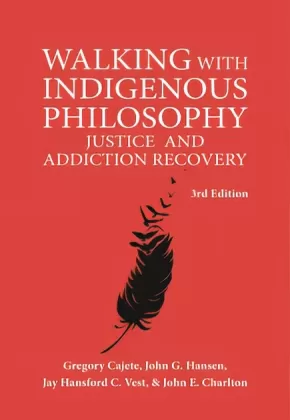Jay Hansford C. Vest
Jay Hansford C. Vest, PhD is an enrolled member in the Monacan Indian Nation and a direct descendent of the famous chief Opechancanough of the Pamunkey Nation, who took Captain John Smith captive as a murder suspect in 1607. In addition, he was honoured with a traditional Pikuni (Blackfeet) name and ceremonially adopted by elder Joe Crowshoe of Brocket, Alberta in June 1989. Dr. Vest holds a BA from the University of Washington, Seattle; and MA, MIS, PhD degrees from the University of Montana. Dr. Vest is Professor of American Indian Studies at e University of North Carolina at Pembroke.
Books (1)
Synopsis:
Dr. Gregory Cajete, Dr. John G. Hansen, Dr. Jay Hansford C. Vest, and Dr. John E. Charlton have expanded the breadth, depth and scope of Walking With Indigenous Philosophy: Justice and Addiction Recovery (3rd ed.) making it a multidisciplinary, international and cross-cultural examination of a restorative justice based approach, that at its heart draws upon the wisdom inherent within Indigenous cultures, in order to question hierarchical and heavily one-sided disease based understanding to addiction recovery.
This third edition continues to advocate a model of restorative justice, saturated throughout by an Indigenous philosophy of holism and healing through inclusion and education, when working with those upon the margins, in order to appreciate and honour the whole person.
Justice is understood as a concept that must be based upon, and within, the recognition of the other. It is from within this recognition of the other that accountability, as a healing endeavour, must find its grounding. The voices of Cree elders indigenous to northern Manitoba, Indigenous Justice Workers, two American Indians (Cajete and Vest), one First Nation (Hansen), one addiction counselling professional (Charlton) and both Indigenous and non-Indigenous people in recovery are heard.
Reviews
"Walking With Indigenous Philosophy: Justice and Addiction Recovery (3rd ed) is an accurate and introspective look at Indigenous peoples and addictions. This exemplary work recognizes storytelling, restorying, and the inherent value within healing through spiritual and cultural praxis that privileges Indigenous ways of knowing. The book challenges the existing paradigm and takes you through an alternative method of being. Great for a textbook and reference for Addictions workers." - Verna Billy Minnabarriet
"For those who teach Native Cultures or want to be better informed, this book is a valuable resource. Its Indigenous perspectives on addiction recovery would be hard to find elsewhere." - Wanda Teays, PhD
Additional Information
238 pages | 6.00" x 9.00" | 3rd Edition | Paperback







